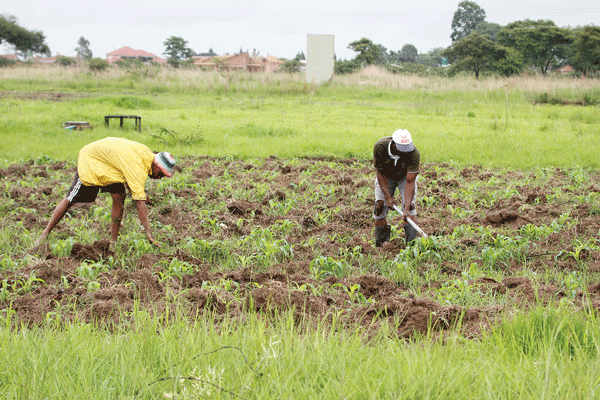
RESPINA Matuku (75) is a well-known urban farmer in Marondera town.
BY JAIROS SAUNYAMA

The senior citizen, who is one of the first people to live in the high-density suburb of Dombotombo, boasts of four pieces of land situated in a wetland on the outskirts of the suburb.
Farming in the wetlands has been Matuku’s source of income since her retirement from the Marondera Municipality 15 years ago.
However, her farming practices are detrimental to the environment.
“The fields are always water-logged and I have to devise ways to come up with a bumper harvest. I plant my maize seeds on contours so that the water doesn’t submerge my plants. I have been doing this for years,” Matuku said.
Her farming practices have angered environmentalists, who have concluded that the erection of contours has fuelled soil erosion, leading to siltation in the nearby water bodies.
Matuku is one of the many urban farmers, whose unmonitored farming practices have become detrimental to the environment in a number of ways.
- Chamisa under fire over US$120K donation
- Mavhunga puts DeMbare into Chibuku quarterfinals
- Pension funds bet on Cabora Bassa oilfields
- Councils defy govt fire tender directive
Keep Reading
Apart from fuelling soil erosion, tampering with wetlands and the uncontrolled application of chemicals is also a cause for concern.
Environmental Management Agency (EMA) Mashonaland East provincial information and publicity officer, Astas Mabwe said there was need for the sustainability of the urban farming practices to preserve the environment.
“Most people practising urban agriculture are doing so to augment their income at the expense of the environment.
Due to shortage of space, they end up farming in wetlands, along streams, on sloppy ground and in mountains, leading to accelerated erosion. There is high erosion and pollution of water bodies due to chemicals applied on crops,” he said.
“Some of them construct ridges downstream to avoid waterlogging, leading to high volumes of soil going to the rivers and dams. As EMA, we maintain that all agricultural activities should be done sustainably. We urge agricultural extension officers to educate people on sound methods of farming. The wetlands are very vital in the survival of people and should be conserved.”
In Harare, savings accruing to small-scale urban farmers are equivalent to more than half a month’s salary, according to a research.
But this development has not been rosy to the environment, as the battle to own a piece of land continues, leaving residents opting for streambank cultivation, as well as invading wetlands.
Harare City Council spokesperson, Michael Chideme, said the local authority had designated farming sites and encouraged residents to stay away from wetlands.
“To put the record straight, Harare City supports the practice of urban agriculture from time immemorial. For example, in 1948, Waterfalls, as a suburb, was de-facto planned urban agriculture, with animal husbandry and grinding mills freely permitted. All high-density suburbs have always practised urban agriculture within the confines of their stands. The people there grow crops such as vegetables, maize and fruit trees,” he said.
Chideme said the municipality had never interfered with practices aimed at putting food on tables, but said mechanisms put in place to safeguard the environment are then misconstrued to imply that council was against urban cultivation.
“What this means is people are free to cultivate on designated and approved pieces of land. The people are free to approach the city’s district offices to be shown the approved sites for urban cropping. However, I seek to educate the people of Harare that cultivating on road verges, stream bank cultivation and on wetlands is prohibited,” he said.
When farming operations are sustainably managed, they can help preserve and restore critical habitats, protect watersheds, and improve soil health and water quality.
However, when practised without care, farming presents the greatest threat to species and ecosystems.
Urban farming that has been practised on wetlands in most cities and towns has negative impacts like land conversion and habitat loss, soil erosion, wasteful water consumption, genetic erosion and climate change, among others.
Wetlands are very important in that they help reduce the impacts of storm damage and flooding, naturally purify water, maintain good water quality in rivers, recharge groundwater, store carbon, help stabilise climatic conditions and control pests.
They are also important sites for biodiversity.
Environment Africa (EA) projects officer, Munyaradzi Kaundikiza said there was need to educate the urban farmers on the best practices, as well as the importance of wetlands.
“Local authorities should work with EMA closely and designate proper arable land for urban farming adoption of soil conservation structures such as contour ridges and planting of vertiver grass to minimise erosion. There is also need for widespread education of urban communities so that they understand why farming in some areas is bad for the environment,” he said.
Kaundikiza added that poor urban farming practices were fuelled by lack of awareness on EMA rules and regulations on the use of arable land.
“Moreover, the absence of expert advice from experts such as Agritex officers for urban farmers is another factor.
We encourage local authorities to have a department or personnel that oversee urban agriculture and provide expertise for urban farmers,” he said.











